Do you want to enable author tracking on your WordPress website?
If you run a multi-author WordPress site, then you’re probably wondering which of your authors write the most popular posts.
In this article, we’ll share how to enable author tracking in WordPress, so you can see all the authors related data that you need to make smart decisions for growing your website.
![]()
Why and Who Should Enable Author Tracking in WordPress?
If you run a multi-author blog, then you need to enable author tracking in WordPress. It allows you to gather data about how each author’s posts are performing on your website.
You can then promote high performing authors and offer some extra help to those who are struggling.
It is also a great way to find out whose posts bring in the most traffic and which articles are engaging readers.
For instance, you might have an author who’s great at writing posts that get lots of visitors, but those visitors may not stick around on your site. This may result in a high bounce rate, fewer page views, and less time spent on the website.
After gathering this data, you can make informed decisions by improving your editorial workflow and offering more tips and help to the struggling writers.
Setting up Author Tracking in WordPress
First, you need to install and activate the MonsterInsights plugin. For more details, see our step by step guide on how to install a WordPress plugin.
MonsterInsights is the best Google Analytics plugin for WordPress. You’ll need at least the Pro plan of the plugin to access the custom dimensions feature.
Upon activation, go to the Insights » Settings page in your WordPress dashboard to enter your license key. You can find this information under your account on the MonsterInsights website.
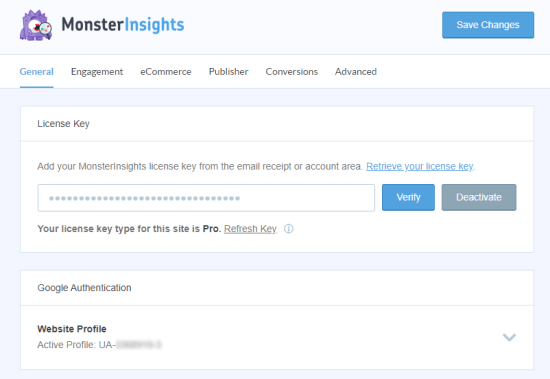
After verifying your license key, you need to connect your WordPress site to your Google Analytics account.
On the Settings page, click on the ‘Connect MonsterInsights’ button to proceed.
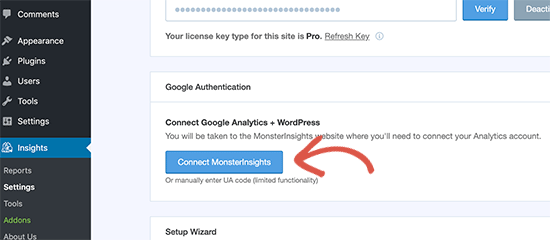
Follow the on-screen instructions to connect your website to Google Analytics using MonsterInsights.
Once connected, Google Analytics will start tracking all your website traffic.
You are now ready to set up author tracking on your WordPress site.
Setting up Author Custom Dimensions for Accurate Tracking
Now that everything is up and running, let’s tell Google Analytics to start tracking authors by adding a custom dimension.
You need to start by visiting Insights » Addons page. From here you need to click on the Install button next to the Custom Dimensions addon.
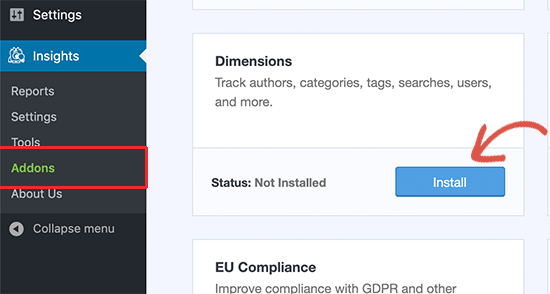
Once it is installed and activated, go to Insights » Settings page and switch to the ‘Conversions’ tab.
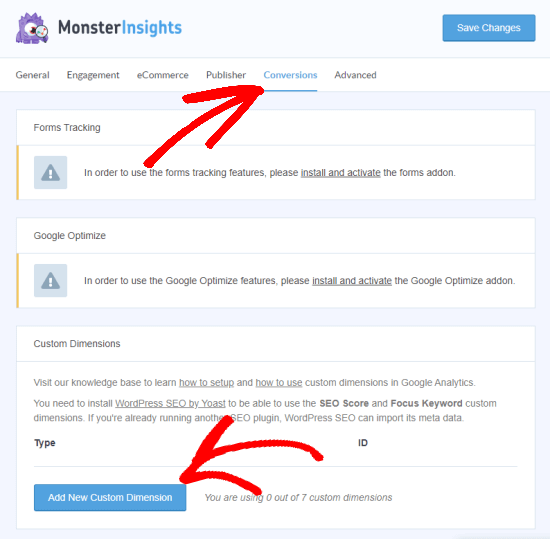
Scroll down a little and you’ll see the Custom Dimensions box. This is where you can add a new custom dimension.
Click on the ‘Add New Custom Dimension’ button and select ‘Author’ from the drop-down menu. The ID will be filled in for you.
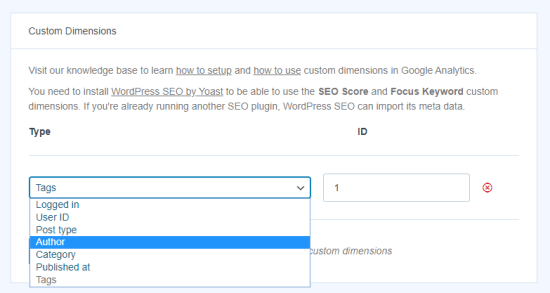
Don’t forget to click the ‘Save Changes’ button at the top of the page to store your settings.
Now that you have set up custom dimensions in MonsterInsights, the next step is to do the same in Google Analytics.
Open your Google Analytics dashboard and switch to the All Website Data view.
From here, you need to click on the ‘Admin’ button at the bottom left corner of the screen and then select Custom Definitions » Custom Dimensions under the Property column.
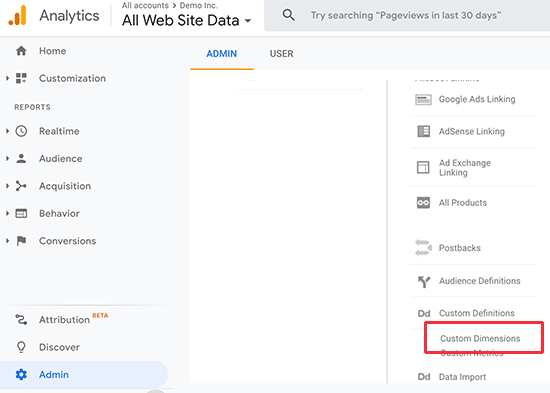
You will need to click the New Custom Dimension button. On the next screen, type in ‘Author’ for the name and leave the other details unchanged.
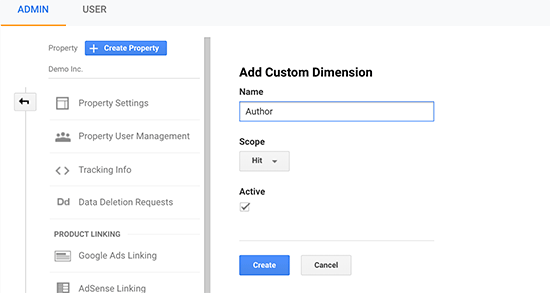
After that click on the ‘Create’ button and Google Analytics will save it for you. You’ll see some code on the next screen. You don’t need to do anything with this, as MonsterInsights handles everything for you. Just click ‘Done’ to continue.
Next, you will see your ‘Author’ custom dimension listed in a table with an Index value.

Make sure that the Author Index value is the same as the ID given to that custom dimension in MonsterInsights.
If not, then don’t worry, you can edit your custom dimension in MonsterInsights and change the ID to match the Index value in Google Analytics.
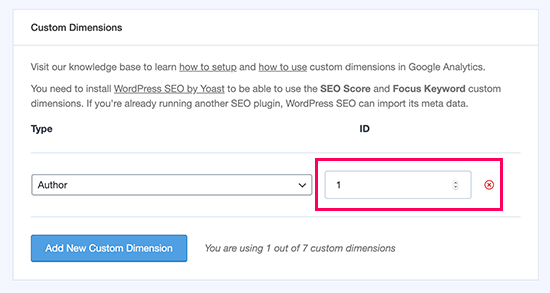
You have successfully set up author tracking on your WordPress website. Now, let’s get to the fun part of viewing the reports and finding out how your authors are doing.
Viewing Your Author Tracking Reports
After your website has collected some traffic data, you can view your top authors inside the WordPress dashboard.
Simply go to the Insights » Reports page and switch to the Dimensions tab.
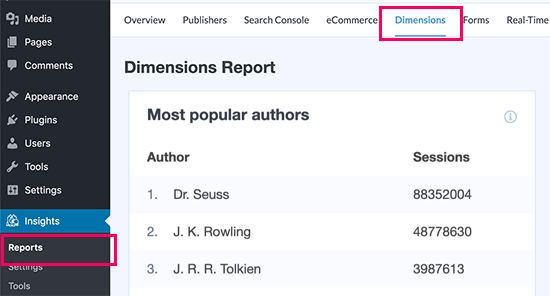
From here you can see your top authors that generate the most traffic on your website.
That’s not all the data. You can compare this data with your overall traffic report to get even more insights.
Switch to your Google Analytics dashboard and go to Customization » Custom Reports section.
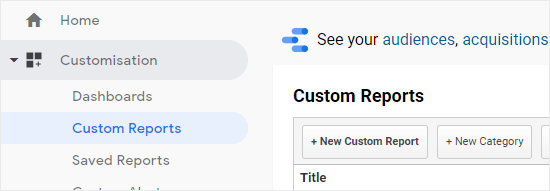
Next, click on the ‘New Custom Report’ button to continue.
You’ll be asked to give your report a title. Enter something useful that helps you easily identify that report.
![]()
After that, you need to choose the metric group. These are the things that you want Google Analytics to show for this report. For instance, we would like to see the bounce rate, pages per session, and average session duration.
Under the Dimensions Drilldowns section, select ‘Author’ and then click on the ‘Save’ button to create your custom report.
You’ll now be redirected to the custom report you just created.
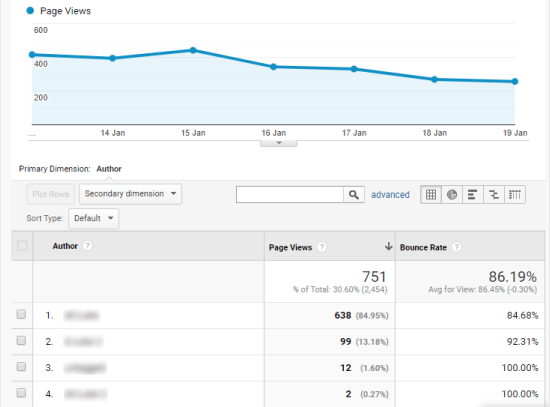
Tip: If there doesn’t appear to be any data in your report, try setting the report date to the current day. If there’s still no data, then that’s likely because you haven’t had any visitors since adding the Author custom dimension in MonsterInsights.
We hope this article helped you learn how to enable author tracking in WordPress. You may also want to check out our guide on how to grow your website traffic with actionable tips that are proven to work. Once you’re done reading that, check out our list of must have WordPress plugins to grow your website.
If you liked this article, then please subscribe to our YouTube Channel for WordPress video tutorials. You can also find us on Twitter and Facebook.
The post How to Enable Author Tracking in WordPress appeared first on WPBeginner.
from Tutorials – WPBeginner https://ift.tt/2Ohwfef
More View at https://mwktutor.com
No comments:
Post a Comment